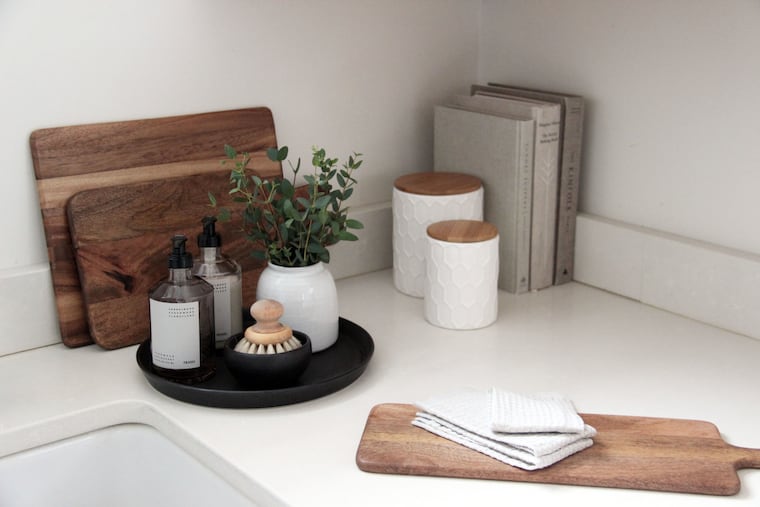Five practical solutions for taming the mess around your kitchen sink
It's easy to ignore the clutter around the kitchen sink as you're rinsing kale or scrubbing a frying pan.

It’s easy to ignore the clutter around the kitchen sink as you’re rinsing kale or scrubbing a frying pan.
But if you stop to take a critical eye to your sink and the counters around it, you might get a bit of a jolt. These spaces often become repositories of drippy bottles, grungy sponges and assorted junk. This can be especially true if your kitchen is small and lacking counter space or storage.
"Simplicity is what you want around your sink," says Henhurst's Phyllis Trevor Higgerson, a New England designer and photo stylist. "As a workspace, you want it to be functional."
In her own small kitchen, she uses a Simon Pearce dinner plate sinkside to keep her products neat: a wooden dish brush in a bowl, refillable Italian glass bottles holding soap and hand lotion, and a white crock of eucalyptus. Dishwasher tabs are stashed in a stoneware canister from T.J. Maxx. She will sometimes light a candle when she’s doing dishes.
"It's important to elevate the things and places we use every day," she says. "It doesn't have to be a stage set, but why not use beautiful things?"
We checked in with some design pros to get some tricks on how to make our kitchen sink areas more functional, organized and attractive.
1. Master your bottles
Dish soap, hand soap, hand lotion: How many of these bulky plastic bottles do you really need at your sink?
“If you can possibly limit the distractions and focus on what you need to do, it will make the job go faster,” says designer Betsy Barmat Stires of Frog Hill Designs in Alexandria, Va. “Piles of kitchen cleaning supplies are not what I like to see.” She often installs built-in soap pumps into her counters, but if that’s not an option, a popular idea is to decant soap into smaller, more attractive containers that pump or pour.
Food52's sleek Zone Danish silicone Zone Dishwashing Set With Squeeze Bottle is intended for this purpose: "It looks better than the Dawn bottle and is great from the sustainability angle," says Peter Themistocles, Food52's cookware, kitchen and pantry buyer. It's more planet-friendly to buy larger bottles and refill your smaller ones, he says. (Method's dish soap refill pouches are sold at Target; Cleancult's shippable refills in paper-based cartons are recyclable.)
Liz Caan, an interior designer based in Newton, Mass., recommends glass bottles. Shazalynn Cavin-Winfrey of SCW Interiors in Alexandria has sourced pump bottles of all styles and budgets, from an embossed silver-gray glass and metal pump from Target ($12.99) to Pigeon and Poodle’s Dalton woven rattan pump at Belle and June ($90).
2. Corral the products you use the most.
Cavin-Winfrey likes to use a small tray or platter that can hold dish soap, a sponge and a brush. You often already have something like this in your kitchen, she says, and it's nice if it's ceramic so you can pop it into your dishwasher. If you want to go a little fancier, West Elm offers several small trays in marble, such as the Foundations Tray ($29-$49) or Marble Vanity Tray ($34). She likes to have a small dish near the sink for rings and watches; a simple dip or sauce bowl in olivewood, brass or blue-and-white china are nice choices, she says.
3. Rethink your dish-drying method.
If you keep a dish rack out all the time, make sure it’s not looking shabby. Cavin-Winfrey prefers to keep her Threshold bamboo rack from Target ($19.99) folded and stored until she needs it. Food52′s steel Yamazaki Home Double Decker Dish Rack ($78) has two levels of storage and a small footprint, making it especially useful for small spaces where cabinet and counter space are limited. A spout moves water into the sink. “It’s minimalist and functional,” Themistocles says.
Christopher Peacock, president and chief executive of the high-end kitchen company that bears his name, integrates dish drying into some of his custom kitchens from the start: “Sometimes we take a piece of marble or wood next to the sink and cut grooves in it — sort of like the draining board is integrated into the countertop, and it drains directly into the sink.” Then there’s no need for a dish rack.
4. Give yourself a green focal point.
Peacock always tries to install a kitchen sink below a window, “looking out onto something green and pretty,” he says. If you don’t have a great view from the kitchen sink, a houseplant can help.
"I'm not really a houseplant person, but in the kitchen, you don't forget to water plants, as they are right in front of you," Caan says. She likes to put a potted topiary (she's fond of Terrain's rosemary topiary, $68) or herbs in little vases next to the sink.
5. Do a frequent clutter check.
Make it a habit to sweep everything off the area around your sink and wipe it all down, keeping out only the things you use daily. Arrange bins under your sink to store dishwasher detergent, counter sprays and scouring pads. If you are lucky enough to have a windowsill, don't let it become a dumping ground for business cards and old coupons, Cavin-Winfrey says, and the same goes for piles of mail on center islands. Be vigilant about weeding out scary-looking old sponges and ratty towels.
“When your kitchen sink area looks nice and tidy, you won’t dread spending time there,” Higgerson says. “It makes a chore almost less of a chore and becomes part of a nice routine of caring for your home and caring for yourself.”